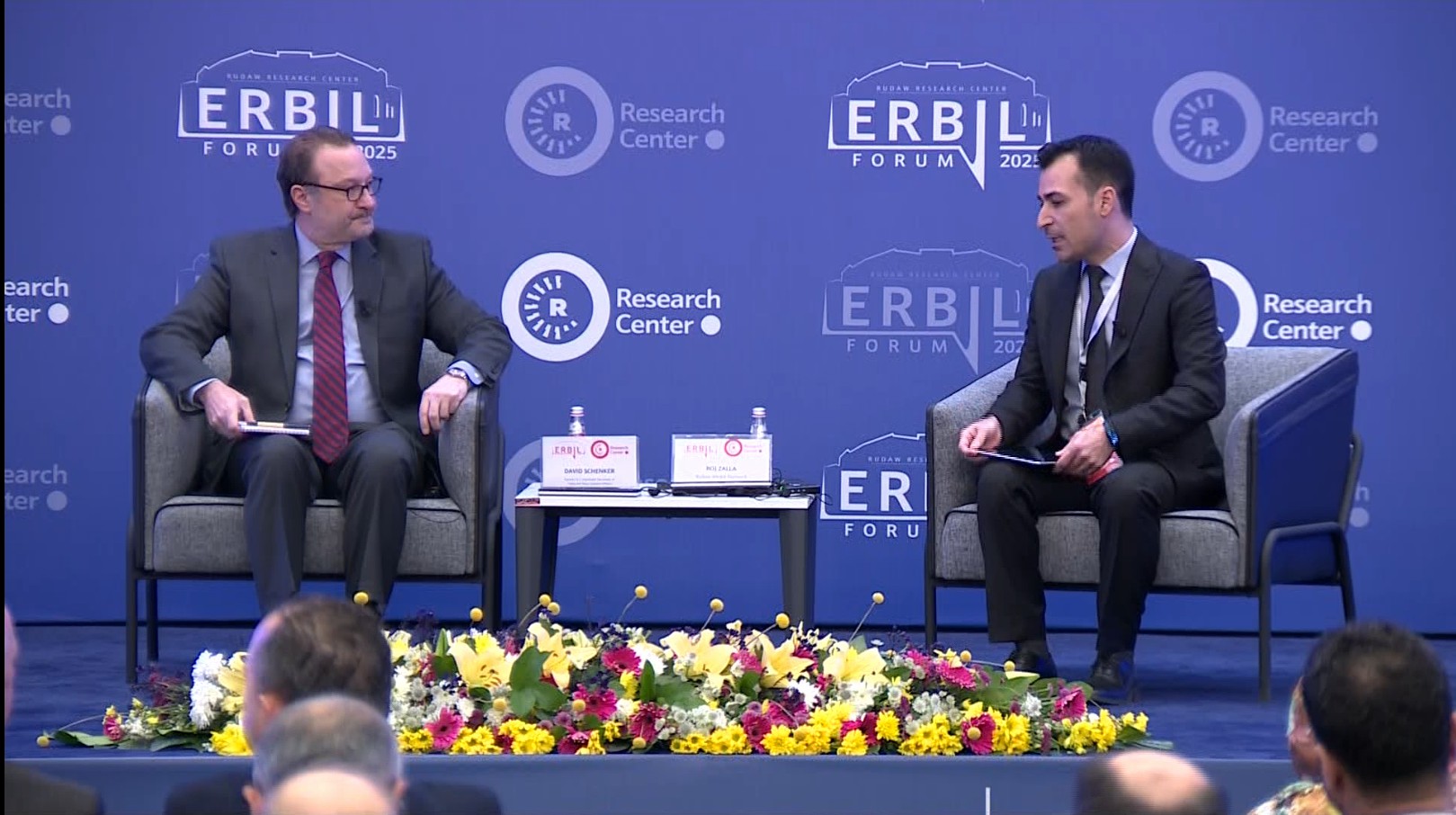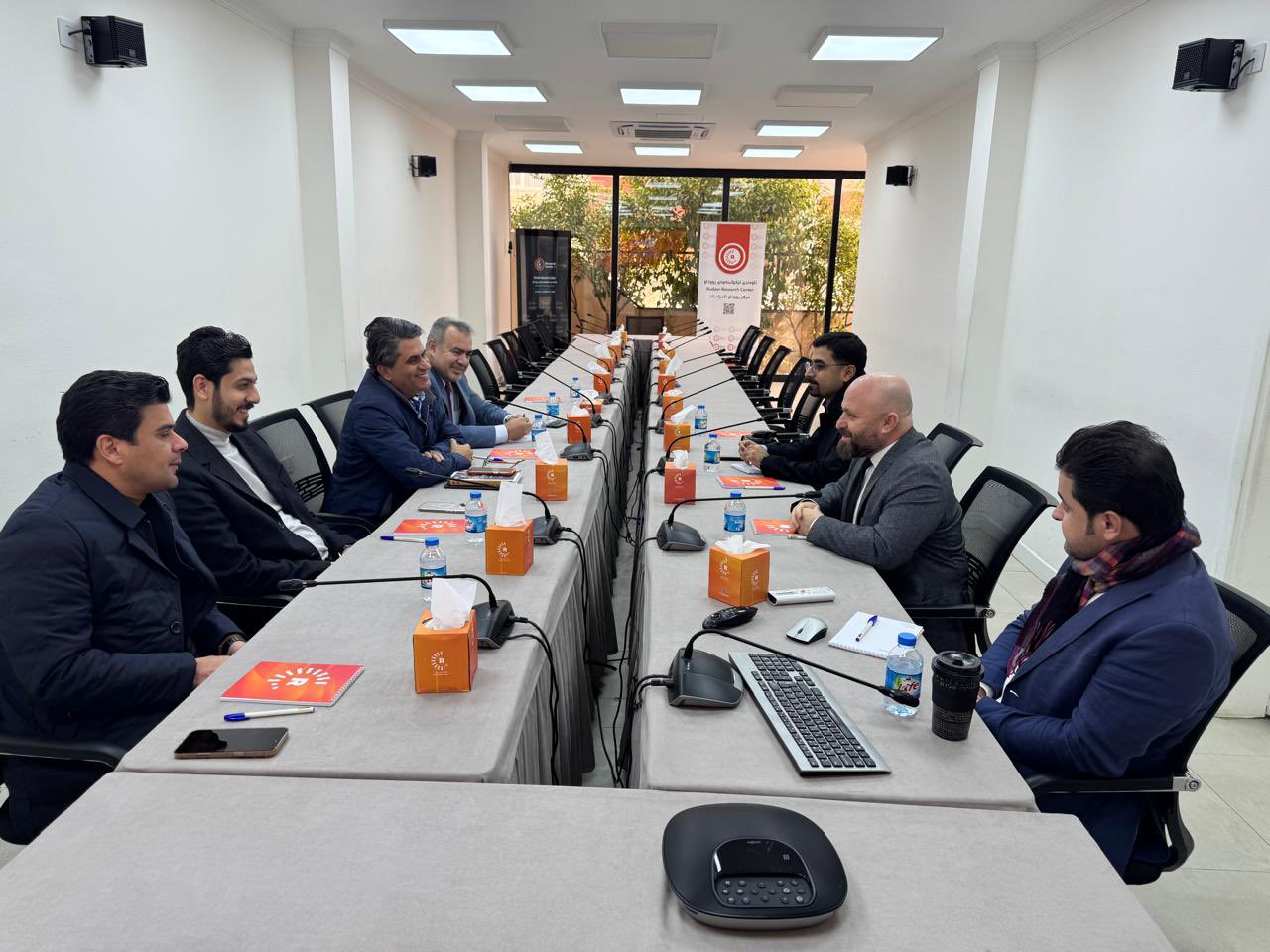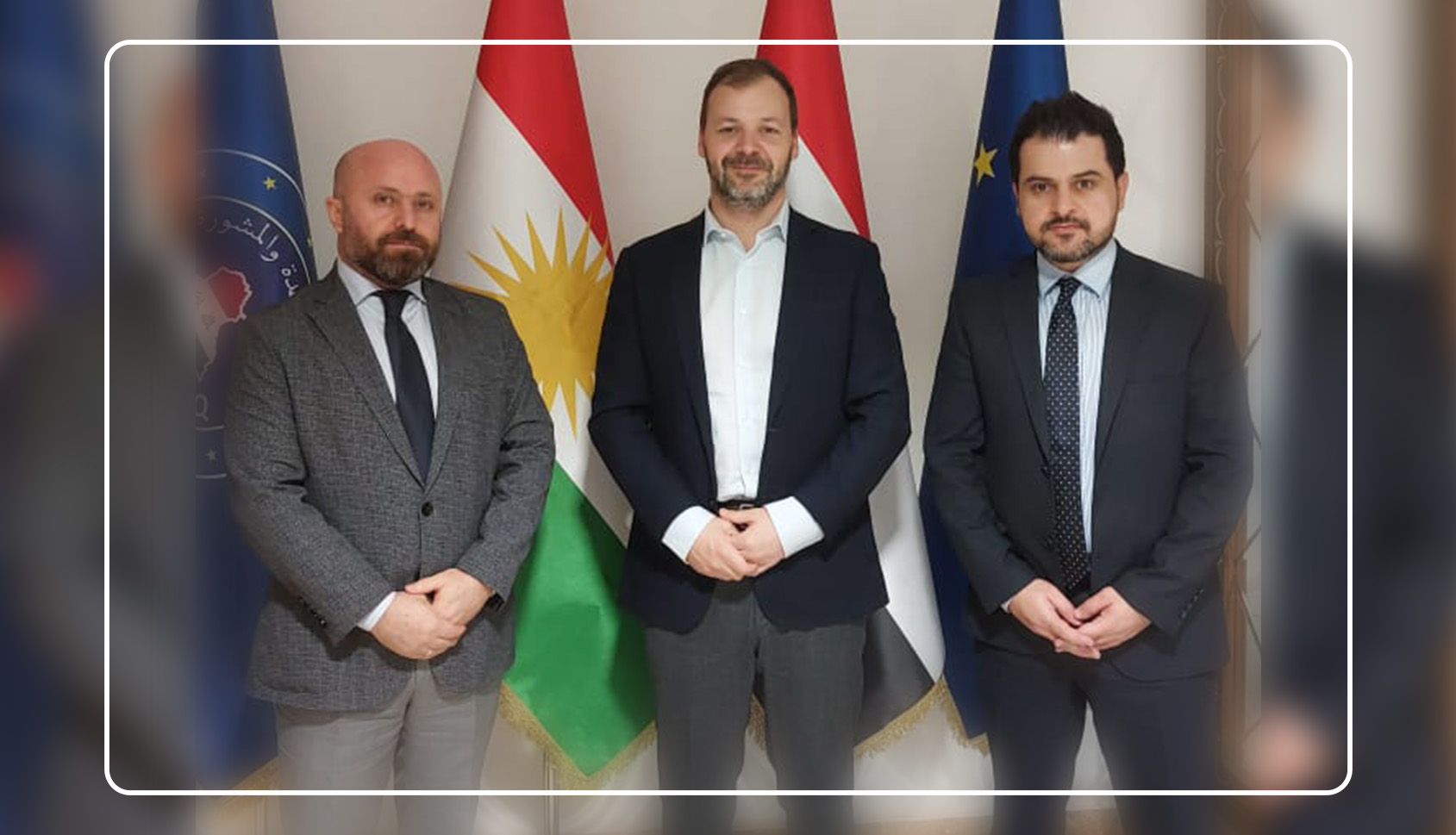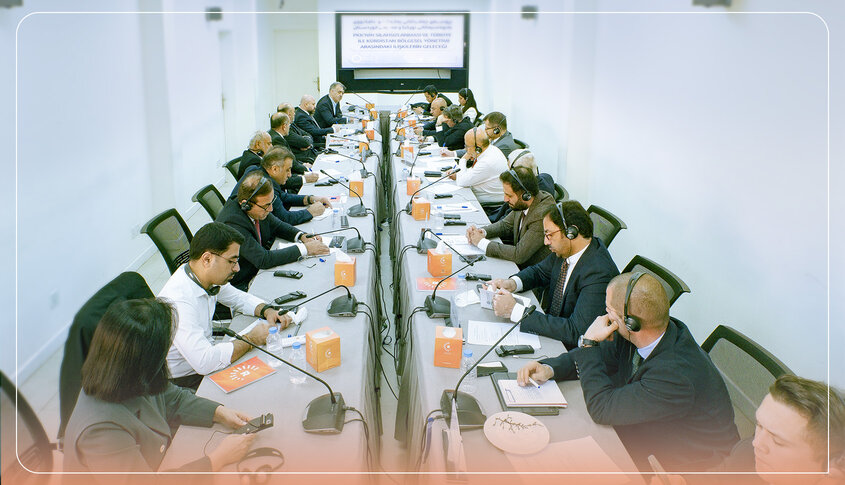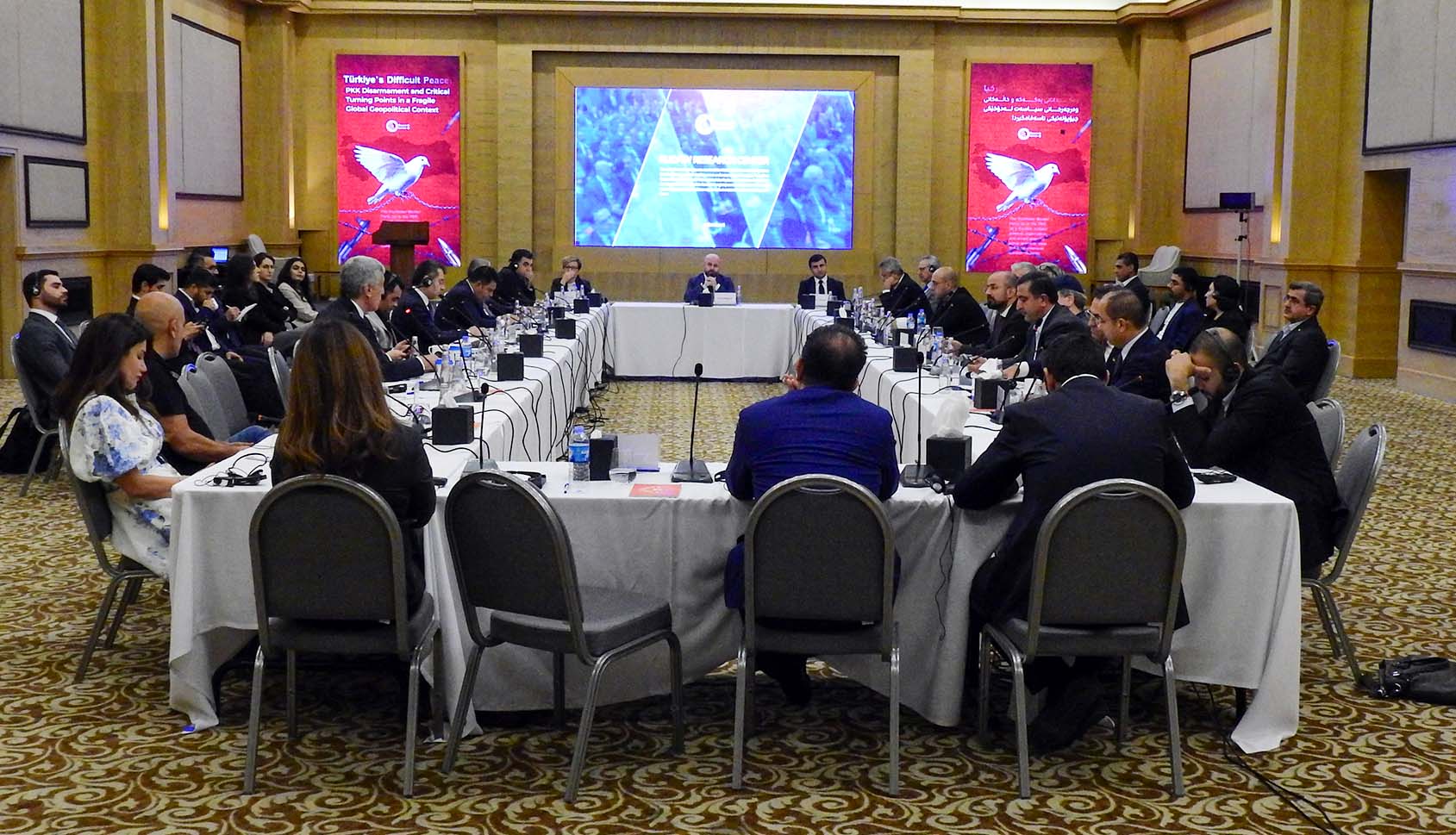Interview 04: US Foreign Policy and its Regional Engagement in the Middle East under Trump
10-04-2025
Roj Zalla:
Thank you, Shahian, for that introduction. For those who may have difficulty understanding Kurdish, my name is Roj Zalla. I’m a journalist with Rudaw, and I’m pleased to be joined by the Honorable David Schenker, former Assistant Secretary for Near Eastern Affairs at the U.S. Department of State.
As you've noticed, there is considerable interest in understanding what the next four years of President Trump’s term might look like for the Middle East in terms of U.S. foreign policy. So let me begin by asking: Are there any indications, based on the few statements we’ve seen so far or the administration’s staffing choices, about what direction U.S. foreign policy under Trump may take? Are we likely to see a departure from his first term, or will it resemble the reactive and transactional approach that characterized much of his previous foreign policy?
Schenker:
Well, thank you. It's good to be with you today. Thanks for having me. Let me start by highlighting a few characteristics of the Trump administration’s foreign policy. One, as you mentioned, is transactionalism. Another would be the predilection for deal-making. And finally—perhaps most importantly—the disruptive nature of the approach.
Also, there was a strongly held aversion to war—a clear opposition to U.S. military action. I believe there will be some consistency with the previous administration, but many of these tendencies and characteristics will likely be accentuated. By that, I mean President Trump and the MAGA (Make America Great Again) movement—which will be even more prominent in a second term—will strongly oppose so-called "forever wars" and long-standing U.S. troop deployments abroad.
In terms of transactionalism, there will be less of the traditional American altruistic approach and more of a benefit-focused strategy—looking for direct, tangible gains for the United States from any foreign engagement. Consequently, we can expect less engagement and reduced involvement in regional affairs. There will also be a significantly heightened focus on domestic politics, including anti-immigration policies, and less emphasis on the United States playing its traditional role as the indispensable ally on the global stage.
RoJ Zalla: Right. So, based on the amount of focus the next U.S. administration will place on foreign policy, what are some of the priorities? Are we seeing the Middle East as one of the key priorities, or are issues like China, Russia, and others taking precedence?
David Schenker: Right now, listen, the administration came in after President Obama, who had spoken a lot about the "pivot to China." I think during the last Trump administration, that pivot was really implemented. Part of that was because of COVID-19, which forced us to focus on China and their increasingly pernicious role in the world. China has become the primary strategic challenge for the United States. The second Trump administration was all about the pivot to Asia. It seems that, for now, the focus is distinctly on the Middle East, and that may continue for a while. But I really do think that in terms of the major issues we're discussing at this conference—Syria, Iraq—you're going to see a downgrading of U.S. involvement, with less intense engagement, fewer troops, and certainly less interest in humanitarian development assistance. The administration will be focused more on deal-making in the Middle East. This might include expanding the Abraham Accords, potentially with Saudi Arabia. We can discuss this further, but this could lead to some tension between the administration and Netanyahu's government in Israel. However, a deal with Saudi Arabia is a priority, and most importantly, as we heard in the last panel, I think there will be a move toward returning to a nuclear deal with Iran, rather than pursuing a military confrontation.
RoJ Zalla: Right, maybe briefly, but in the last Erbil Forum, you actually referred to the areas of continuity between the first Trump administration and the Biden administration. So, perhaps we can revisit that question. What do you think are the main areas of continuity, or the biggest area of continuity, between the previous administration and the second Trump presidency? And what do you see as the biggest changes?
David Schenker: Well, I think Iran will be a major area of continuity. Both administrations are making efforts to return to a deal with Iran. The difference between Biden and Trump, of course, is that Trump attempted to get back into a deal with Iran through a "maximum pressure" campaign. Another area of continuity will be, of course, support for Israel. Biden faced criticism from some quarters for an alleged lack of support for Israel, but I believe he was one of the most pro-Israel presidents in U.S. history, and I expect that to remain consistent. Beyond that, in the region, I think there will be even less interest in developments in Syria than there was during either the Biden or Trump administrations. Regrettably, I also think there will be less interest in Iraq.
RoJ Zalla: Right. So, to narrow the conversation down a little bit to Iraq and Syria: The Trump administration is now applying heavy pressure on Iraq to resume Kurdish oil exports, including threats of sanctions. What does this tell us about Trump's approach to Iraq versus the Kurdistan Region?
David Schenker: Listen, I think there is a tremendous amount of support and empathy within Washington, both in Congress and the administration, for the Kurdistan Regional Government (KRG). This, I believe, will benefit the KRG in several ways. Particularly if there is a downsizing of the U.S. military presence in Iraq, there will likely still be a residual force remaining in the KRG. Additionally, as there will be significant reductions in U.S. military financing around the world, I think the $20 million per month allocated to the Peshmerga will likely continue, though it may be conditioned in some ways. It is already conditioned, but not enforced, on the unification of the Peshmerga forces.
For the rest of Iraq, I think we’re going to return to what we saw during Trump’s first term, which is holding Iraq to a higher standard. If you go back and read the President’s Presidential Security Memorandum from February 4th, it outlines Iraq as a priority in the maximum pressure campaign against Iran. This includes cutting off all routes for the illicit use of dollars and smuggling, which fund the regime in Tehran. Likewise, there will be moves to combat smuggling and efforts to pressure the Iraqi government in Baghdad to stop providing safe haven and support to Iranian proxies, such as the Popular Mobilization Forces (PMF).
RoJ Zalla: Right. But does this tell us anything about how President Trump views Iraq now? Does it suggest that President Trump sees Iraq as an actor that needs to be coerced into meeting certain demands the U.S. has in the region?
David Schenker: You know, I don’t think President Trump gives a great deal of thought to Iraq. Iraq is part of his maximum pressure campaign. It is a country that, as you may have seen in Joe Wilson’s tweets—which I’m sure many here are reading with great interest—has to balance its relationship between the United States and Iran. Yet, the government in Baghdad pays salaries to 338,000 members of the PMF, including several U.S.-designated terrorist organizations. That’s going to be a problem for the Trump administration.
RoJ Zalla: Right. With the Trump administration’s freeze on financial and foreign aid, and orders to the Pentagon to prepare for budget cuts, how likely is it that the Trump administration will keep the defense appropriation unchanged? We know that the fiscal year for 2025 allocates about $528 million to the Peshmerga forces, the Syrian Democratic Forces (SDF), and the Iraqi Security Forces (ISF). Will that remain?
David Schenker: So, you’re talking about Syria or Iraq? I think the $430 million or so in Foreign Military Financing (FMF) and other economic aid to Iraq is going to be on the chopping block. Some of it may remain, but I don’t think President Trump will consider that a priority, or something that benefits the United States. Now, by the way, when I say this, I want to clarify that I personally disagree. I believe it is very much in the U.S.’s interest to remain engaged in Iraq for a number of reasons, not all of them related to Iran. However, I think the President will view not only the 2,500 troops in Iraq but also the 850 in Syria—now 2,000 since the revolution—as part of the so-called "forever wars," which is something Trump has said he was elected to end.
So, I would expect President Trump will receive a perfect phone call from Erdogan. Erdogan is somewhat of a, in my view, a "Trump whisperer." He will likely convince the President that Turkey can take over the U.S. role in Syria. Turkey can provide security, secure camps, and fight ISIS in cooperation with the new Syrian government, allowing the United States to withdraw its troops and later downsize its presence in Iraq.
RoJ Zalla: Right. Actually, I do want to come to that, but before we get to that question, I’d like to ask another one. Now, transitioning to more serious and specific issues. Kurds have lost over 15,000 lives in the fight against ISIS under American leadership. On Tuesday, the Syrian National Conference concluded without a single Kurdish party being invited. In response, 35 Kurdish parties issued a joint statement expressing concern over the direction that Damascus is taking. Several declarations were made, but none addressed Kurdish rights or even acknowledged their existence in the country. So, the question is: How will the U.S. position itself in response to this exclusion of the Kurds? Do you think Washington will address this issue, or will it remain indifferent to it?
David Schenker: Well, let me start by saying there’s been a lot of hand-wringing about Mohammed al-Shara and the future of Syria—whether he is a member of ISIS or Al-Qaeda. To be sure, in Idlib, for eight and a half years, al-Shara fought both ISIS and Al-Qaeda. He has made several statements about Syria’s future being tolerant and pluralistic, and he opposes the implementation of Sharia law. He may, however, eventually turn out to be repressive. And I still think that would be an improvement over the Assad regime, which murdered half a million of its own civilians and forced between six to ten million Syrians, mostly Sunni Muslims, into exile abroad. I believe the murders resemble genocide, and the exile, ethnic cleansing. In this regard, I think al-Shara would be a better alternative.
This conference was poorly organized—there was only a day and a half of notice, attendance was low, and it reflected a real lack of organization and foresight. I hope they will be more conscientious in the future. What I would say is that this was a pre-conference to the actual constitutional conference. The international community should focus on pushing al-Shara and others to do better as they move forward. This may end up being a repressive, non-tolerant regime, but the Assad regime was repressive, intolerant, and murderous. I wish I could hold a higher standard for what my expectations would be. But I believe the West really has to keep a close eye on Syria’s trajectory.
One final point: President Trump has said that he’s not interested in being involved in Syria. I think this is a mistake. The United States should be engaged in helping to shape Syria's future direction, pushing them toward a positive and inclusive society where all components of Syria play a role and their rights are safeguarded. But so far, we are seeing that this is just one area where Trump doesn't want to be involved and is delegating responsibility to the Europeans.
RoJ Zalla: Right. Given all the radical changes in the past year or so in the Middle East, is it more feasible for President Trump to actually follow through with withdrawing troops from Syria? I hear a lot of people saying that we do need American troops in Syria for multiple reasons. But also, is it a dichotomous choice? Is it either/or, or is there some middle ground that can be worked out?
David Schenker: Well, listen, policy is people, and we still have to see who the people are in the right positions in Washington. We know Joel Rayburn will be coming in as the Assistant Secretary of Near Eastern Affairs. We'll see how involved the Secretary of State, Mike Pompeo, wants to be in this issue. The Department of Defense, as well, I don’t see them wanting to remain in Syria. But listen, Erdogan, the Turks, want to play a role in Syria. They want the United States out. They see Syria as a sphere of influence. This, as you know, is not going to be particularly good for the Kurds. And that is actually the dichotomy because Washington supports the Kurds. Yet, Trump has this relationship with Erdogan that will likely lead to a greater Turkish role in Syria. The bigger the role the Turks play in Syria, by the way, the bigger the role the Israelis are going to play. These two states, while one is a major non-NATO ally and the other is a NATO partner, are not getting along particularly well.
RoJ Zalla: I'm actually glad you mentioned that because, as you pointed out, withdrawing troops from Syria is not just between Turkey, the U.S., and other regional actors. We've seen high-level diplomatic traffic between Saudi Arabia and the new authorities in Damascus. The U.S. legitimized its presence in Syria primarily by countering Iran and fighting ISIS. However, the United States has never had the official authority to be in Syria.
RoJ Zalla: Not officially, correct. Not officially. But now, the Iran factor is almost gone. Fighting ISIS—Turkey is proposing or suggesting that it can lead a coalition to take over that role. But how might other regional actors, such as Saudi Arabia, react to an expanded role for Turkey in Syria?
David Schenker: I think this is why we’re seeing the UAE, Saudi Arabia, and other states in the region getting involved. They too are concerned about perceived Turkish expansionist tendencies. And I think al-Shara himself—listen—no doubt has some Islamist inclinations, whether this is now, you know, Al-Qaeda-lite or the Muslim Brotherhood. That clearly places him as an ideological fellow traveler with Turkey, which is highly sympathetic to the Muslim Brotherhoodtrend. There is, I think, a natural relationship between the government in Damascus and Turkey, but this remains a grave concern.
Syria is the center of the Fertile Crescent, the heart of the region. It borders Jordan, an American ally, as well as Lebanon, Turkey, Israel, and Iraq, not least among them. It could do significant damage if Syria does not have a government effectively controlling its territory. There will be spillover and all sorts of regional consequences. Nobody wants to see that.
RoJ Zalla: I'm wondering...
David Schenker: I mean, it could go the way of Libya, right? There's nothing that suggests Syria, or al-Shara, will be able to bring all these militias under control and succeed in this state-building endeavor.
RoJ Zalla: Right. Actually, I have time for one final question. I want to go back to the issue of foreign aid and President Trump's focus on cutting it, especially concerning the situation at al-Hol camp. We know that in the past, efforts to encourage other countries to repatriate their citizens from al-Hol haven’t worked very well. There are still over 40,000 individuals linked to ISIS. With the U.S. administration signaling that it can no longer fund the al-Hol camp, what other alternative strategies can Washington pursue to prevent the camp from becoming a breeding ground for ISIS recruitment?
David Schenker: Yeah, listen, we're very early into the Trump administration. They've frozen all funding. In effect, they've taken a sledgehammer to the problem of U.S. spending when what’s needed is a scalpel. They cut funding for the CDC, right? So we're no longer investigating Ebola outbreaks in Africa or addressing measles or bird flu in the U.S. They fired the people in charge of nuclear weapons safety here in the U.S. and had to rehire them. This is another case where they've cut funding that was vital for securing the people. Security personnel are still covered by Defense Department funding, so there are still guards being paid, but the social services and other essential services? Well, they’ve stopped. In the long term, this is going to create significant problems. My hope is that Secretary of State [Marco] Rubio will recognize this as an important issue and advocate for the return of this funding. Otherwise, other countries—perhaps in Europe—will have to step up and cover the expense.
Listen, the U.S. does an enormous amount around the world. As a percentage, maybe not as much as some other countries, but in absolute terms, far more than any other country. When it comes to humanitarian security, we have enormous responsibilities and a massive debt. This administration is committed—whether for better or worse—to reducing that debt. And that means another principle of Trump foreign policy: burden-sharing. Our partners need to do more. While I disagree with much of the administration’s approach, I think burden-sharing is the right strategy. The U.S. should not be responsible for funding every mission worldwide, particularly when other states are more directly affected and have the resources to cover these costs.
RoJ Zalla: You worked at the State Department. Does it worry you that removing such an important diplomatic tool might allow other actors to take advantage and regain a foothold?
David Schenker: Yes, this is a critical question for the Trump administration and for the U.S. moving forward. We have a limited set of foreign policy tools. We have diplomatic efforts, where we try to convince states to align with us. We have the military option, which can involve threats, strikes, and drone operations. We have economic coercion through tools like Treasury sanctions, which can be crippling—extremely difficult for those who are sanctioned. And then, of course, we have the incentivizing tool, which is economic and humanitarian assistance. Historically, this tool has set the U.S. apart, showing a level of altruism that other nations often lack. If we remove that tool, over time, I believe it will significantly diminish our ability to convince both adversaries and allies to follow our policy directions.
I’m not particularly concerned about countries like China filling that gap. China doesn’t give away money. They offer loans at predatory rates, which lead to debt traps. Just ask countries like Jordan or Djibouti about that.

